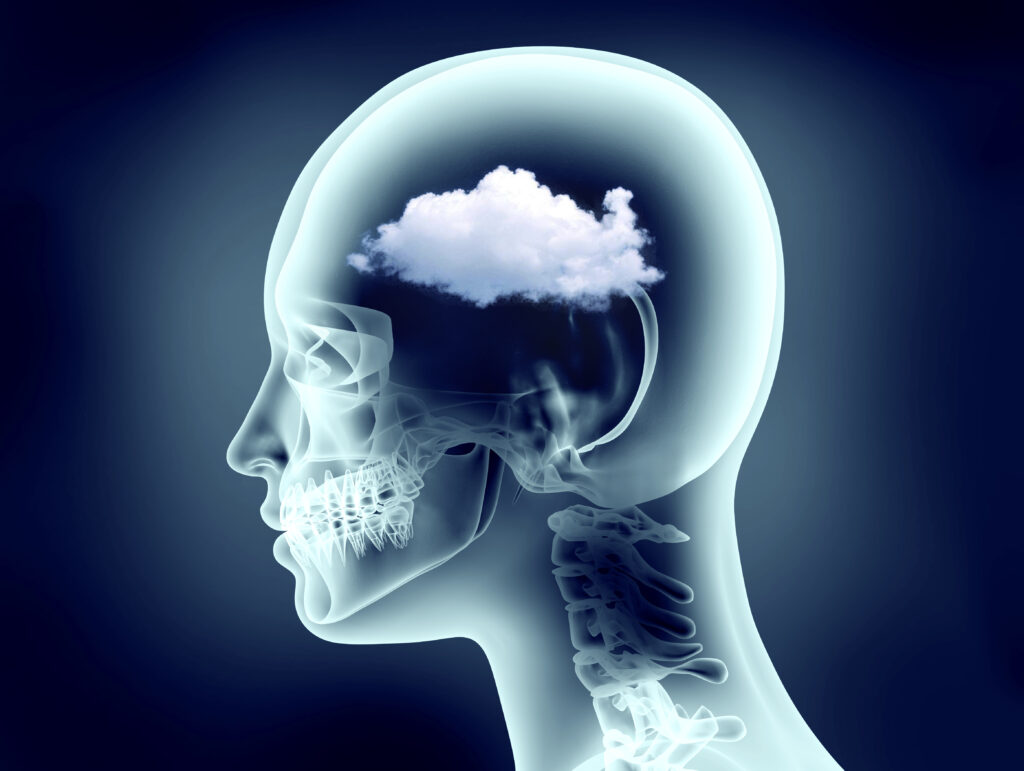What is brain fog?
Brain fog is a term that many people know but can sometimes be difficult to describe, especially if you’re feeling it. It makes people feel fuzzy or exhausted, and makes it almost impossible to complete normal tasks. People suffering from brain fog may experience problems with attention, concentration, speech, memory, organization, and other cognitive skills. It can be hard to keep one’s thoughts straight and long stretches of time can pass without getting much done. They may describe being easily confused, unmotivated, or frustrated, and if the condition persists, they may feel anxious or depressed about their circumstances. Some people can work through brain fog, while others find it debilitating.
Brain fog is not just related to feeling tired after exertion, nor will it go away if a person takes a short break or rest. Brain fog does not exist on its own; it tends to be a symptom of other difficulties or disorders. These can be related to lifestyle factors, emotional well-being, and physical processes. Below are some examples of causes, including what we’re learning about the novel coronavirus. Please note that many of these factors can be interrelated. For example, chronic stress may lead to not eating and sleeping well, and can negatively influence cardiovascular health.
Causes of brain fog
Nutrition and Chemicals
- Poor diet interferes with multiple system functions and may involve:
- Vitamin deficiency (e.g., D, B12)
- Nutrient deficiency (e.g., iron, iodine)
- Too much sugar
- Energy dense foods (empty calories, highly processed)
- Not eating enough
- Substances
- Caffeine withdrawal
- Nicotine intoxication/poisoning/withdrawal
- Alcohol and other drug use
Sleep
- Sleep plays an important role in brain health, including facilitating removal of waste, maintaining neuronal connections, and optimizing functions like learning and memory.
- Too little sleep mimics brain fog, but underlying conditions that cause brain fog may also make it more difficult to sleep.
- Disrupted sleep leads to poor sleep quality or too little sleep, and involves waking up when you don’t intend to and/or difficulty returning to sleep when you need to.
- Sleep problems can lead to or be caused by a variety of other issues.
- REM Sleep Behavior Disorder can cause poor sleep
Mood
- Stress and anxiety overburden your mind and contribute to cognitive fatigue.
- Depression is often associated with difficulties concentrating, low motivation, and problems getting things done.
- Dissociative states, such as those experienced by people who have gone through trauma, can mimic brain fog. Symptoms can persist even after the person regains integrated consciousness.
- Perception of one’s abilities can heavily influence a person’s experience of brain fog. Those who are sensitive to perceiving that there is something wrong with them, or who constantly compare themselves to a previous level of functioning, may find themselves more stressed, frustrated, and hopeless. This can create a cycle of increasing symptoms.
Metabolic/Endocrine
Although an exhaustive list will not be provided here, many dysfunctions of the metabolic and endocrine systems may produce brain fog. Common ones include:
- Thyroid imbalance: hyperthyroidism and hypothyroidism are both associated with difficulty concentrating, memory concerns, and other cognitive dysfunctions.
- Diabetes: hyperglycemia and hypoglycemia are harmful to the body in different ways, but both can lead to problems with hormone levels, neurotransmitters, and structural damage to the brain.
- Menopause: the decrease in estrogen and progesterone temporarily causes concentration and memory difficulties.
Novel Coronavirus
- COVID-19 affects multiple systems, all of which can negatively impact cognitive functioning: cardiovascular, pulmonary, gastrointestinal, renal, and we’re still learning more every day. Additionally, the following may produce brain fog:
- Oxygenation problems due to lung or cardiac issues
- Inflammation in multiple systems
- Medication side effects
- Sleep disturbance
- Stress, anxiety, and social isolation
- Under investigation:
- role of the hypothalamus
- filtering waste in the brain (microglia/CSF)
Other Disease Processes
- Fibromyalgia
- Myalgic encephalomyelitis
- Lupus
- Traumatic Brain Injury (TBI)
- Orthostatic intolerance and other cerebral blood flow issues
- Iatrogenic causes (i.e., treatments creating symptoms: chemotherapy, medication side effects, restricted diets for weight loss)
- NOTE: please discuss any concerns with your doctor and do not discontinue recommended treatments – although some treatments may cause adverse side effects, they are life saving and may have the potential to improve cognitive functioning (for example, when an obese person loses weight)
As you can see, many conditions and factors can cause or contribute to brain fog. However, there are also many things that can be done about it.
Increase your clarity!
- Address health factors
- Improve nutrition by following diets recommended for brain health, such as the Mediterranean diet or DASH
- Minimize processed foods, fast foods, sugar, alcohol, and other substances
- Optimize sleep
- Get exercise, as is recommended by your doctor
- Be aware that some conditions, such as myalgic encephalomyelitis and TBI, may only tolerate light exercise. Higher intensity exercise can exacerbate symptoms of brain fog in some cases.
- Rest when you need to, and find out what actually makes you feel better (hint: closing your eyes for a few minutes, meditating, or getting fresh air might make you feel better than watching TV or checking social media)
- Address medical factors
- Don’t avoid treatment for necessary health conditions and follow your doctor’s recommendations (or get a second opinion if you’re not sure)
- Tell your doctor if you’re experiencing brain fog, because they may be able to help you pinpoint the source
- Take COVID precautions, including physical distancing, hand washing, and wearing face coverings in public places
- Pharmacotherapy may support functioning in some cases
- Psychological interventions
- If you feel stressed or depressed, reach out for help
- CBT, ACT, and DBT are therapeutic theories and techniques that help with motivation, perception of your brain fog, and trigger management (e.g., tolerating normal fatigue after exercise)
- Build resilience and coping strategies, including mindfulness
- Executive functioning coaching
People often find it helps to pace themselves, learn how to manage deadlines and expectations, and develop awareness of what they need to be the best they can be. In conclusion, given the right strategies and support, learning how to live life with brain fog is possible.


